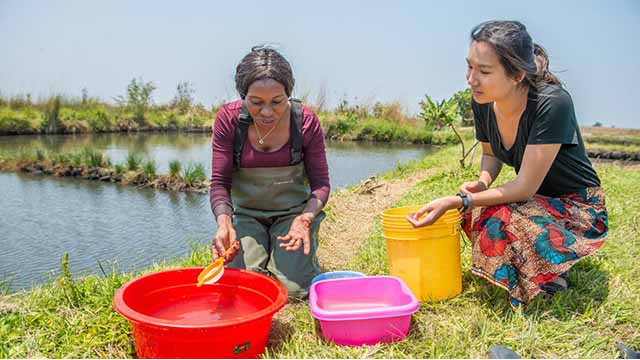
By Nelson Odume and Andrew Slaughter
The African continent is disproportionately affected by extreme climate. Droughts or floods are becoming more frequent. Many African regions are experiencing water stress because of too much – or too little – water.
It’s more than just a climate issue. Water plays a role in political instability, economics, migration, degrading ecosystems and disease.
If African governments are serious about overcoming these challenges, one of the things they must focus on is developing and supporting highly-skilled water professionals. This describes anyone involved in the management of water. It could range from a person who manages a city’s sanitation services to a hydrologist generating data to help guide national water policies.
This can be most effectively achieved through research and education in Africa that’s led by African institutions. And that requires investment. The continent’s universities need more money and resources to run water-related professional courses and degree programmes. Both governments and the private sector should be looking to provide the necessary resources.
In this way, Africa will be better placed to take a strategic approach to meeting its water research and education needs. This should integrate the strengths and resources of all the countries on the continent to meet common goals: fostering water research that is important to Africa; led by African institutions and committed to developing the skills of African water professionals.
Shortcomings and struggles
There are some serious shortcomings in Africa’s tertiary institutions that hinder research and education. One of the most critical is a lack of research capacity.
This manifests in many ways: under-qualified research staff, a lack of specialist scientific equipment, tiny or non-existent budgets for maintenance and repairs. People also struggle with heavy work loads and a lack of mentorship.
There are also very few water-related professional courses and degree programmes. This is in stark contrast with developed countries. For example, the IHE Delft Institute for Water Education in the Netherlands says it “has provided graduate education to more than 15,000 water professionals from over 160 countries”. It would be great if a similar programme existed in Africa.
Another serious challenge is that most African countries make little budgetary allocation to research and development. South Africa invests the most of any African country among the organisation for Economic Co-operation and Development (OECD) countries. But even this is still less than 1% of its GDP, well below most other OECD nations.
Researchers then have to depend on non-African countries and organisations for funding – and those funders set the research objectives and agenda. International organisations often don’t fully understand the complexity of problems facing African countries or regions. Also, research groups from outside the continent usually conduct their research and then leave when the project is complete. That means such projects offer very little sustainable benefit to ordinary people in Africa.
The funding available for water research in Africa from national research councils is also never guaranteed. This is because economic conditions and political priorities are constantly shifting.
Collaboration is going to be crucial in the coming years and decades if Africa’s institutions are to crack this problem.
Working together
Some of this collaboration and sharing is already happening.
The African Research Universities Alliance (ARUA) was set up to “facilitate collaboration, knowledge transfer, equipment sharing, pooling of resources and development of mutually-beneficial partnerships across Africa”. In this spirit, it proposed the formation of Centres of Excellence across Africa related to key thematic areas. Water is among them.
Rhodes 老虎机游戏_pt老虎机-平台*官网 in South Africa was recently awarded the Water Conservation Centre of Excellence. It will be led by the university’s Institute for Water Research. The centre’s role will be to administer research funds and provide key administrative support related to research and training.
All of this will involve co-ordination with other countries involved in ARUA: Nigeria, Ghana, Tanzania, Kenya, Rwanda, Senegal, Uganda and Ethiopia. In this way, different countries’ strengths can be shared to further common research goals and education needs.
The success of this centre, and others, will depend to a large extent on their ability to attract long-term research funding.
There are models which prove this – one on the African continent already WaterNet brings together the complementary strengths of institutions in southern and eastern Africa that specialise in water. The purpose is capacity building in the sector.
Since its inception in the year 2000, WaterNet has graduated 378 water professionals through its MSc degree programme. It has also trained 737 professionals through short courses. Its retention rate is also commendable.
This model, along with one like the Carnegie Foundation-funded Regional Initiatives in Science and Education and its successor, the AESA-RISE Postdoctoral Fellowship Program, demonstrate the significance of sustainable long-term support for research and capacity development.
Not all of these initiatives were water-research specific. But they could be adapted to support emerging initiatives like the Water Conservation Centre of Excellence.
Putting water research first
Collaboration is important, but individual African research institutions will also need to play their part. They can do this by facilitating their researchers’ career enhancement, helping them to obtain PhDs. Training is also vital. Everyone benefits when researchers are taught to write better papers and funding proposals.
African countries can continue neglecting their homegrown water management capacity, stumbling from one climate disaster to the next. Or they can take their rightful place within the global community, and ensure solutions for Africa by Africa.
Source: https://theconversation.com/africa-needs-to-invest-more-in-its-water-professionals-91398
